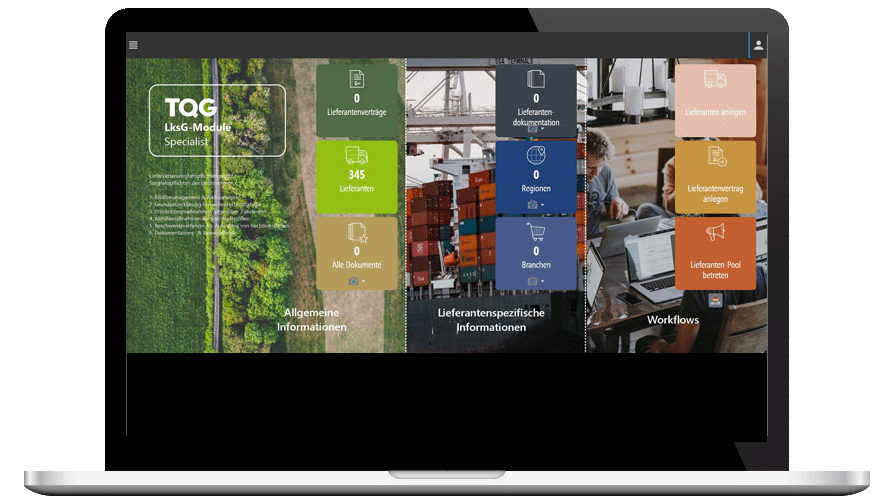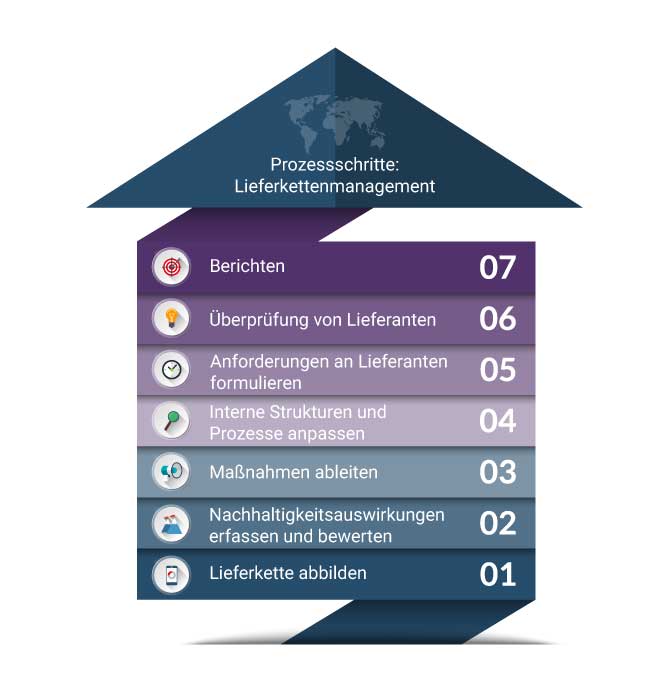Supply Chain Management
What does "Supply Chain Act" mean?
The term "supply chain management" is a compound term. It consists of the terms: Supply + Chains + Management. This is understood to mean the monitoring of supply chains in companies. A supply chain (cf. § 2 paragraph 5) includes all steps at home and abroad that are necessary for the manufacture of products and the provision of services, from the extraction of raw materials to delivery to the end customer. It refers to the own business unit, direct suppliers and indirect suppliers.
The Supply Chain Act is also known as the Supply Chain Due Diligence Act (LkSG). It aims to achieve the international human rights situation through legally prescribed compliance.
The law sets requirements for responsible supply chain managemen for companies. It creates a legal framework for the fulfilment of companies' human rights due diligence obligations, adapted to internationally compatible requirements. The Supply Chain Act contains a catalogue of internationally recognised human rights conventions and "translates" them into behavioural requirements for companies. A catch-all clause covers unlawful violations.
Manage due diligence obligations successfully!
Due diligence obligations are corporate obligations: under the LkSG, it is your responsibility to take care of environmental and human rights issues and to document them carefully.
To do this, responsibilities must be redefined and reporting obligations completely revised.
Supply chain management as part of a digital platform!
Supply chain management and the corresponding requirements can be mapped very well with the TQG businessApp cloud platform. The platform has an intuitive user interface and can be used globally in numerous languages. There are options for product viewing, file viewing, controlling and a process for supplier self-disclosure.
- Task & function: digital whistleblower and complaint platform
- Target group: Medium-sized companies & large corporations.
- Advantages: Preserve human rights, prevent scandals, protect whistleblowers, reduce lost sales, meet legal requirements (EU Whistleblowing Directive and Supply Chain Act), approvals through an electronic signature.

What is the current legal status of the Supply Chain Act in Germany?
On 11 June 2021, the Federal Government passed the draft law on the Supply Chain Act. On 25 June 2021, the Federal Council approved the law. It strengthens the protection of human rights in global supply chains and ensures compliance with basic human rights standards.
Businesses must ensure respect for human rights throughout the supply chain.
They must, among other things, set up grievance mechanisms and report on their activities.
Unternehmen müssen für die Einhaltung der Menschenrechte auf der gesamten Lieferkette sorgen.
Sie müssen u.a. Beschwerdemöglichkeiten einrichten und über ihre Aktivitäten berichten.
Seit 2023 gilt das Gesetz in Deutschland für Unternehmen mit mehr als 3.000 Mitarbeitenden, seit 2024 schon für solche mit mehr als 1.000 Mitarbeitenden.
Since 2023 the law applies in Germany to companies with more than 3,000 employees.
Since 2024 the law applies to companies with more than 1,000 employees

